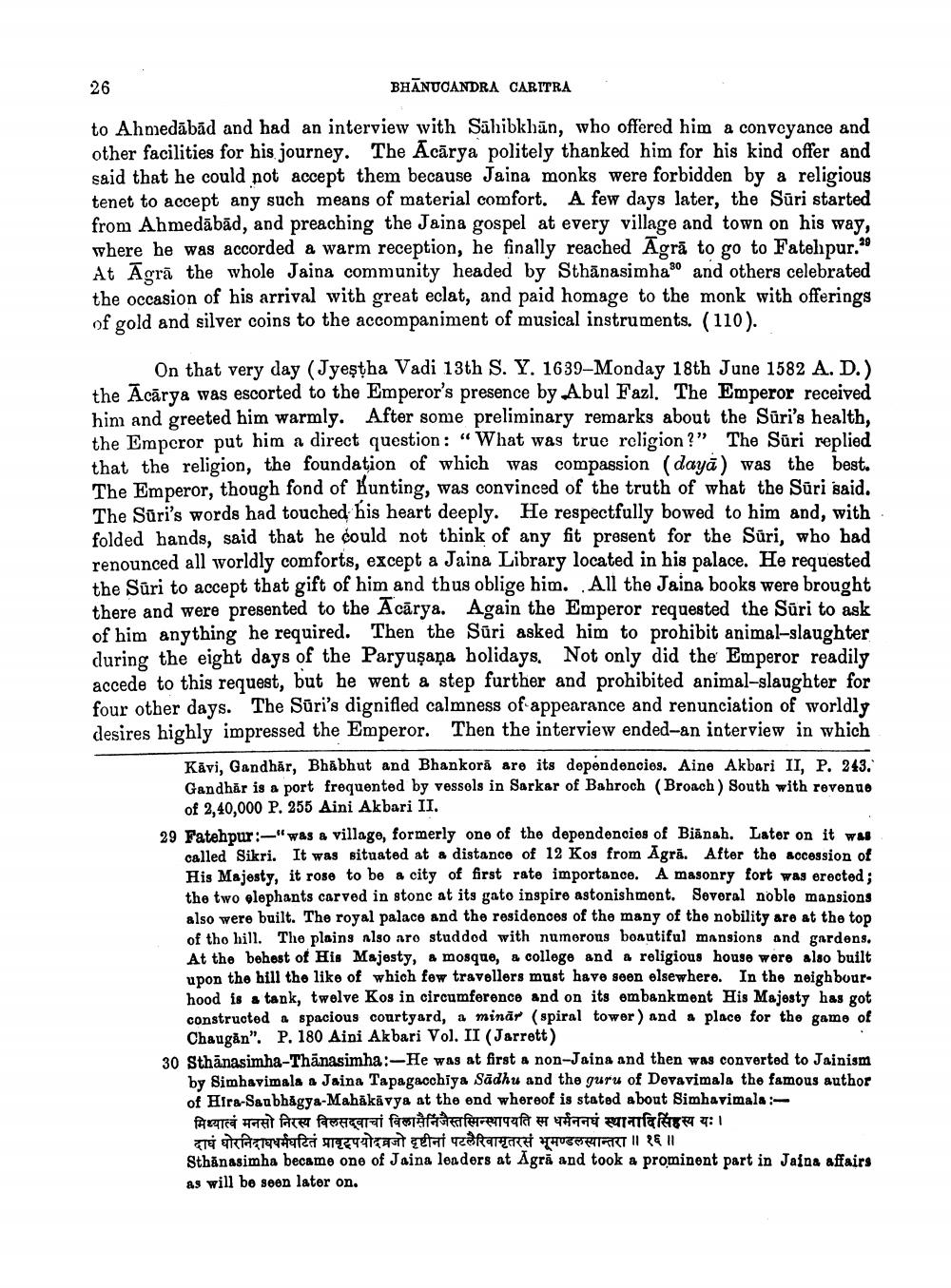________________
26
BHĀNUCANDRA CARITRA
to Ahmedābād and had an interview with Sahibkhān, who offered him a conveyance and other facilities for his journey. The Acārya politely thanked him for his kind offer and said that he could not accept them because Jaina monks were forbidden by a religious tenet to accept any such means of material comfort. A few days later, the Sūri started from Ahmedābād, and preaching the Jaina gospel at every village and town on his way, where he was accorded a warm reception, he finally reached Agrā to go to Fatehpur.49 At Agrā the whole Jaina community headed by Sthānasimhas and others celebrated the occasion of his arrival with great eclat, and paid homage to the monk with offerings of gold and silver coins to the accompaniment of musical instruments. (110).
On that very day (Jyeştha Vadi 13th S. Y. 1639-Monday 18th June 1582 A. D.) the Ācārya was escorted to the Emperor's presence by Abul Fazl. The Emperor received him and greeted him warmly. After some preliminary remarks about the Sūri's health, the Emperor put him a direct question: “What was true religion?” The Sūri replied that the religion, the foundation of which was compassion (dayā) was the best. The Emperor, though fond of Kunting, was convinced of the truth of what the Sūri said. The Sūri's words had touched his heart deeply. He respectfully bowed to him and, with folded hands, said that he could not think of any fit present for the Sūri, who had renounced all worldly comforts, except a Jaina Library located in his palace. He requested the Sūri to accept that gift of him and thus oblige him. All the Jaina books were brought there and were presented to the Acārya. Again the Emperor requested the Sūri to ask of him anything he required. Then the Sūri asked him to prohibit animal-slaughter during the eight days of the Paryuşaņa holidays. Not only did the Emperor readily accede to this request, but he went a step further and prohibited animal-slaughter for four other days. The Sūri's dignified calmness of appearance and renunciation of worldly desires highly impressed the Emperor. Then the interview ended-an interview in which
Kāvi, Gandhăr, Bhābhut and Bhankorā are its dependencies. Aine Akbari II, P. 243. Gandhăr is a port frequented by vessels in Sarkar of Bahroch (Broach ) South with revenue
of 2,40,000 P. 255 Aini Akbari II. 29 Fatehpur: "was & village, formerly one of the dependencies of Biānah. Later on it was
enlled Sikri. It was situated at a distance of 12 Kos from Agrā. After the accession of His Majesty, it rose to be a city of first rate importance. A masonry fort was erected; the two elephants carved in stone at its gato inspire astonishment. Several noble mansions also were built. The royal palace and the residences of the many of the nobility are at the top of tho hill. The plaing nlso aro studdod with numerous boautiful mansions and gardens. At the behest of His Majesty, a mosque, a college and a religious house were also built upon the hill tho like of which few travellers must have seen elsewhere. In the neighbourhood is a tank, twelve Kos in circumference and on its embankment His Majesty has got constructed spacious courtyard, a minām (spiral tower) and a place for the game of
Chaugan". P. 180 Aini Akbari Vol. II (Jarrett) 30 Sthānasimha-Thānasimha:-He was at first a non-Jaina and then was converted to Jainism
by Simhavimala a Jaina Tapagacchiya Sadhu and the guru of Devavimala the famous author of Hira-Saubhagya-Mahākavya at the end whereof is stated about Simhavimala :मिथ्यात्वं मनसो निरस्य विलसद्वाचां विलासैनिजैस्तस्मिन्स्थापयति स धर्मननघं स्थानादिसिंहस्य यः।
दाचं घोरनिदाघधर्मघटितं प्रावृट्पयोदव्रजो दृष्टीनां पटलैरिवामृतरसं भूमण्डलस्यान्तरा ॥ १६ ॥ Sthănasimha became one of Jaina leaders at Agrā and took a prominent part in Jaina affairs as will be seen later on.




